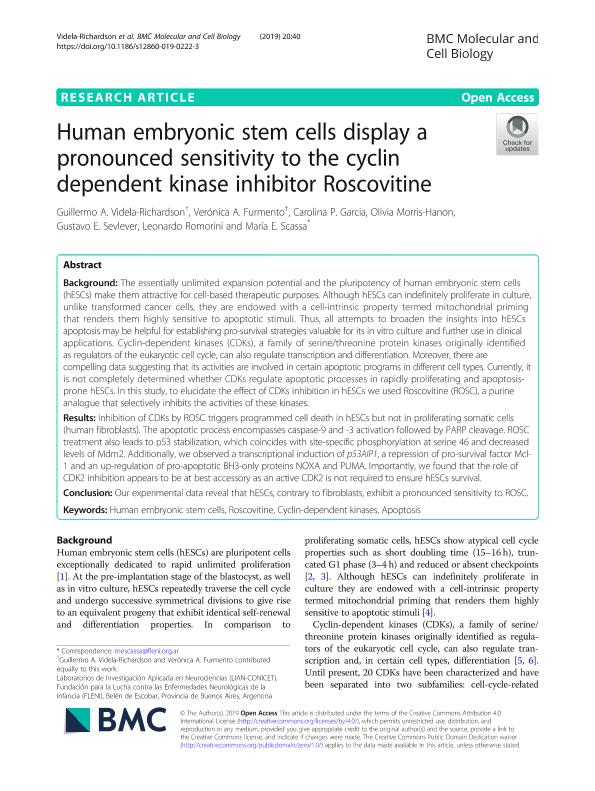Artículo
Human embryonic stem cells display a pronounced sensitivity to the cyclin dependent kinase inhibitor Roscovitine
Videla Richardson, Guillermo ; Furmento, Verónica Alejandra
; Furmento, Verónica Alejandra ; Garcia, Carolina Paola
; Garcia, Carolina Paola ; Morris Hanon, Olivia
; Morris Hanon, Olivia ; Sevlever, Gustavo; Romorini, Leonardo
; Sevlever, Gustavo; Romorini, Leonardo ; Scassa, Maria Elida
; Scassa, Maria Elida
 ; Furmento, Verónica Alejandra
; Furmento, Verónica Alejandra ; Garcia, Carolina Paola
; Garcia, Carolina Paola ; Morris Hanon, Olivia
; Morris Hanon, Olivia ; Sevlever, Gustavo; Romorini, Leonardo
; Sevlever, Gustavo; Romorini, Leonardo ; Scassa, Maria Elida
; Scassa, Maria Elida
Fecha de publicación:
28/08/2019
Editorial:
BioMed Central
Revista:
Bmc Cell Biology
ISSN:
2661-8850
Idioma:
Inglés
Tipo de recurso:
Artículo publicado
Clasificación temática:
Resumen
Background: The essentially unlimited expansion potential and the pluripotency of human embryonic stem cells (hESCs) make them attractive for cell-based therapeutic purposes. Although hESCs can indefinitely proliferate in culture, unlike transformed cancer cells, they are endowed with a cell-intrinsic property termed mitochondrial priming that renders them highly sensitive to apoptotic stimuli. Thus, all attempts to broaden the insights into hESCs apoptosis may be helpful for establishing pro-survival strategies valuable for its in vitro culture and further use in clinical applications. Cyclin-dependent kinases (CDKs), a family of serine/threonine protein kinases originally identified as regulators of the eukaryotic cell cycle, can also regulate transcription and differentiation. Moreover, there are compelling data suggesting that its activities are involved in certain apoptotic programs in different cell types. Currently, it is not completely determined whether CDKs regulate apoptotic processes in rapidly proliferating and apoptosisprone hESCs. In this study, to elucidate the effect of CDKs inhibition in hESCs we used Roscovitine (ROSC), a purine analogue that selectively inhibits the activities of these kinases. Results: Inhibition of CDKs by ROSC triggers programmed cell death in hESCs but not in proliferating somatic cells (human fibroblasts). The apoptotic process encompasses caspase-9 and -3 activation followed by PARP cleavage. ROSC treatment also leads to p53 stabilization, which coincides with site-specific phosphorylation at serine 46 and decreased levels of Mdm2. Additionally, we observed a transcriptional induction of p53AIP1, a repression of pro-survival factor Mcl1 and an up-regulation of pro-apoptotic BH3-only proteins NOXA and PUMA. Importantly, we found that the role of CDK2 inhibition appears to be at best accessory as an active CDK2 is not required to ensure hESCs survival. Conclusion: Our experimental data reveal that hESCs, contrary to fibroblasts, exhibit a pronounced sensitivity to ROSC
Palabras clave:
APOPTOSIS
,
CYCLIN-DEPENDENT KINASES
,
HUMAN EMBRYONIC STEM CELLS
,
ROSCOVITINE
Archivos asociados
Licencia
Identificadores
Colecciones
Articulos(SEDE CENTRAL)
Articulos de SEDE CENTRAL
Articulos de SEDE CENTRAL
Citación
Videla Richardson, Guillermo; Furmento, Verónica Alejandra; Garcia, Carolina Paola; Morris Hanon, Olivia; Sevlever, Gustavo; et al.; Human embryonic stem cells display a pronounced sensitivity to the cyclin dependent kinase inhibitor Roscovitine; BioMed Central; Bmc Cell Biology; 20; 40; 28-8-2019; 1-15
Compartir
Altmétricas



